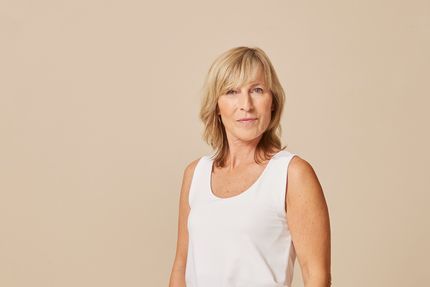

7 common myths about menopause
We know a lot about menopause and the hormonal changes that take place during this time. Nevertheless, there are still persistent myths. Or, to put it differently, misconceptions. These misconceptions can be very confusing, which is understandable – but unnecessary. Because with the right information about your body, navigating through menopause can be a much smoother journey.
We're debunking seven common misconceptions about menopause.
1. Menopause is a period of a woman’s life
The term menopause is often used incorrectly. Menopause is the time when you stop having menstrual periods. Menopause literally means a woman's last menses (period), and this can only be determined in hindsight. Once you've stopped menstruating for 12 consecutive months, you’ve passed through menopause and are in postmenopause. So menopause is not a period, but a moment in time. Most women reach menopause around the age of 51. Your mother’s history is a predictor of when you’ll go through it.
The transition from the reproductive to the postreproductive years in a woman’s life consists of three stages: perimenopause, menopause and postmenopause. The entire transition can take seven to ten years. This varies per person.
2. Every woman goes through menopause and there’s nothing you can do about the symptoms
Nothing is further from the truth! Of course, every woman goes through menopause. There isn't much you can do about that. That's just nature. But this doesn't mean you have to suffer needlessly. Menopausal symptoms are caused, in part, by hormonal fluctuations. Your hormones are like an orchestra: if one is too high or too low, the others are off.
For all your hormones to play in harmony, they need to pay attention to the conductor of the symphony. And that conductor is you. What we are trying to say is that there’s a lot YOU can do to alleviate your menopausal symptoms, or even prevent them from occurring.
To do so, you need to know what is causing your symptoms. Then, with the aid of a personal lifestyle plan you can work on restoring hormonal balance.
There are also many preventive measures you can take to lower your risk of developing menopausal issues. After all, prevention is better than cure. When your body is well balanced you are more likely to have a pleasant menopausal experience.
Products for menopause relief
3. Weight gain is inevitable
Not every woman gains weight during her menopausal years. This can vary from one person to another. Some women have healthy eating habits but still put on a lot of weight. Some gain just a few pounds around the abdomen. And others don’t gain any weight at all.
One thing is certain: at this time in your life your hormones are out of whack. And this can impact your weight. But there are also other factors that can contribute to weight gain. Menopause-related sleep problems can influence your appetite. It can even wake you up in the middle of the night and have you raiding the fridge. Obviously, this isn't good for your weight.
As you get older, you lose muscle mass, which slows your metabolism. Menopause also makes you more sensitive to stress. Your body needs to make sure that you have enough energy to deal with stress, which is why you have sugar cravings.
So why is it a myth that weight gain is inevitable? The truth is, there’s a lot you can do to lose weight or prevent gaining weight in the first place. Will this be easy? Probably not. Often losing weight gets harder with age. It can be a daunting task, but it's definitely possible – if you change your habits. A healthy lifestyle is key!
4. Smoking doesn’t affect menopausal symptoms
Changing unhealthy habits is always a good idea. This is especially true when it comes to smoking. Why? According to research, smoking can bring on an early menopause.
Cigarette smoke decreases the production of oestrogen. The more you smoke, the faster this decrease happens. Early menopause increases the risk of various conditions, including cardiovascular disease, diabetes, Alzheimer's disease and osteoporosis.
Smokers are also more likely to have hot flashes. This can affect sleep quality, causing you to have less energy during the day. There’s a good chance that you’ll gain weight, too. Your body needs energy. What’s a way to get it quickly? That’s right... sugar.
5. Hormone therapy is the only remedy
Hormone therapy can be a good option for taking the edge off your menopausal symptoms. That's absolutely true. However, it is not the only option. Let’s explain that a bit more.
During menopause, your sex hormones – oestrogen and progesterone – start to decrease. This is how nature works. Menopause marks the end of the fertile phase of a woman's life. It costs the body energy to menstruate, so from an energy expenditure perspective, it makes sense to stop this process. This way, the body can use this energy for other functions.
Your body still needs oestrogen and progesterone, but not as much as before menopause. So when your ovaries close shop, it's your adrenal glands that produce a small amount of sex hormones. There are lifestyle interventions that you can easily implement to support this process in your body.
These interventions are your starting point. Every woman has a unique hormonal landscape, influenced by the interplay of hormones. The first thing you want to do is get a clearer picture of where your imbalances may lie. OK, compared to hormone replacement therapy (HRT), dietary and lifestyle adjustments are not a quick fix. But if you want lasting results, then slower is always better. Many women feel (and look!) better after making positive changes.
If you're struggling to get results through diet and lifestyle changes alone, you can consider talking to your GP about HRT. This also applies to women with emotional menopause symptoms. Hormone therapy often gives quick results. Depending on your situation, lifestyle adjustments may also be advisable. After all, good health starts with a healthy lifestyle.
6. Your sex life is over
Many women see their libidos take a nosedive around menopause. However, there are also women whose libidos increase. The degree of sexual desire experienced during this time of transition is different for everyone. If your sexual drive has declined, this may be due to various reasons.
Menopause can cause vaginal dryness (thinning, drying and inflammation of the vaginal walls may occur due to hormonal imbalances). This can make sexual intercourse painful, which can affect sexual desire.
However, almost any woman (regardless of age) can get turned on and wet. When a woman becomes aroused, the blood vessels in her genitals dilate and fluid is secreted through the vaginal wall. This doesn’t have anything to do with oestrogen, but rather with the right stimulation and a relaxed environment. It can, however, take a while longer to get wet. That's where the power of foreplay comes in. So, slow down and take your time!
Furthermore, menopause is a phase in which women take stock. Do you still feel happy in your chosen field of work? Is your relationship still filled with sparks? If not, this could also be a reason for having less desire to be intimate with your partner.
7. Hot flashes are the first sign of menopause
False! A change in menstrual pattern is typically the first sign that menopause is approaching. A 'change' can mean that first periods come more frequently and then less frequently, before they ultimately stop. Most women don’t have hot flashes during this stage – although this doesn't apply to all women. For some women, menopause can bring mood swings, weight gain, gloominess and fatigue, even though they still have regular periods.
From the age of 35 your ovaries gradually produce less of the sex hormones oestrogen and progesterone. You will start to notice the first signs of this around the age of 40. In general, most women aged 45 have entered the menopausal transition stage. This is usually when the first hot flashes arrive. However, a fair number of women don't get hot flashes until much later, in postmenopause. And some women don’t get them at all.
Again, each woman's journey is unique. What is menopause like for you? DM us on Instagram and let us know.
Alleviate your menopausal symptoms
Each woman's body is different, and when it comes to the menopausal transition, no woman's journey is the same. This means there is no one-size-fits-all solution. Discover how lifestyle, nutrition, supplements and medical treatments can support your health during your menopausal journey.

Sources
- Dąbrowska J, Dąbrowska-Galas M, Rutkowska M, Michalski BA. (2016). Twelve-week exercise training and the quality of life in menopausal women - clinical trial. PMID: 27095954.; PMCID: PMC4828504.
- Taebi M, Abdolahian S, Ozgoli G, Ebadi A, Kariman N. (2018). Strategies to improve menopausal quality of life: A systematic review. PMID: 30079364.
- Hoga L, Rodolpho J, Gonçalves B, Quirino B. (2015). Women's experience of menopause: a systematic review of qualitative evidence. PMID: 26455946.
- Hayatbakhsh MR, Clavarino A, Williams GM, Sina M, Najman JM. (2012). Cigarette smoking and age of menopause: a large prospective study. Maturitas. PMID: 22695707.
Possibly of interest to you


FAQ
What can I do about my symptoms during the menopause?
With the right remedies and adjustments, you can balance your hormones and alleviate or prevent many symptoms during the menopause. Your diet and lifestyle can have a major influence. Dietary supplements can also help. If a change in diet and lifestyle is not enough, medical support is a great help. More about the treatment of menopausal symptoms.










